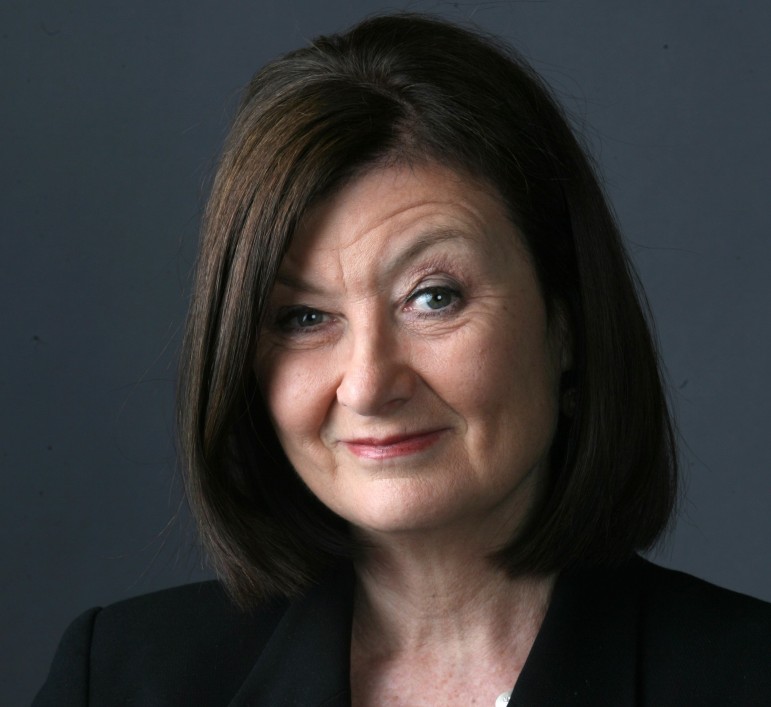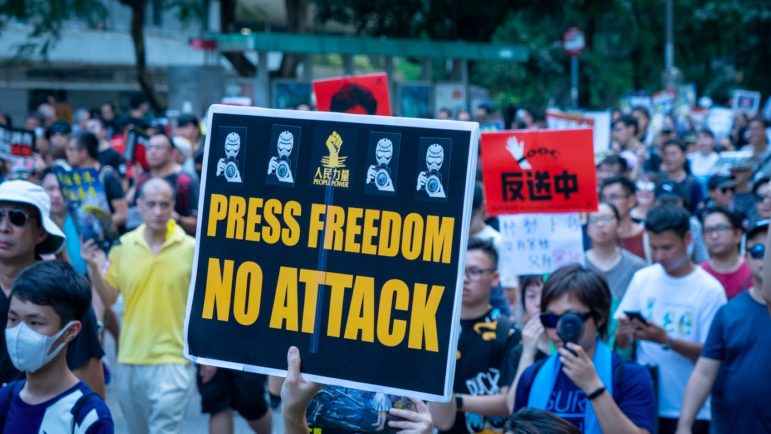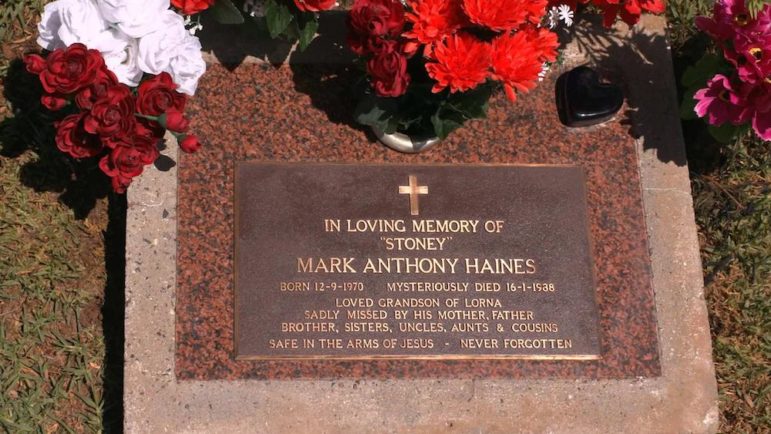

Where Angels Fear To Tread
One of the pleasures of editing this website is bringing voices to our global community from great investigative journalists around the world. Here’s one of them: Kate McClymont, a veteran Sydney Morning Herald reporter who one website dubbed “Sydney’s queen of crime and corruption exposes.” The excerpt below is from McClymont’s May 3 speech at the Australian Press Freedom Dinner. — The Editors
For democracy to function it is essential that we have a free and fearless press. But that doesn’t mean the members of the press will be popular.

Kate McClymont is an investigative reporter with the Sydney Morning Herald.
The theme of this year’s World Press Freedom Day is “Safe to Speak: Securing Freedom of Expression in All Media.”
Journalists in Australia have not been killed on home soil while reporting. But that’s not to say we are not subject to intimidation, surveillance, and threats. Four shots were fired into Hedley Thomas’s Brisbane house in 2002.
It is our job to bring to light the things that those in power don’t want the public to see. An array of very powerful people will do almost anything to shut you up.
If you want people to applaud what you do, then join the circus. If you want to be a decent journalist, accept that you are not choosing a path to popularity.
Paul Keating once wrote a letter to the Herald. “Is this woman a stalker, or is she just underemployed? Will we find her next sniffing bicycle seats in nearby Darling Harbour?”
Last week, author Bob Ellis wrote: “Kate McClymont ruined my life and I do not like her. She is going after Craig Thomson lately, and she had better watch it.”
Jockey Jim Cassidy once spat on my back — or, given his size — the back of my knees.
“You fucking bitch, you’ve ruined my life,” he said.
Tom Domican, charged with murder, attempted murder and conspiracy to murder (then acquitted of the lot) once sent me this message: If I were a man he would have broken my jaw by now. [module align=”right” width=”half” type=”pull-quote”]Jockey Jim Cassidy once spat on my back. “You fucking bitch, you’ve ruined my life,” he said.[/module]
The Kazal Brothers
Take my colleague Linton Besser. What has happened to Linton recently is both disgraceful and really frightening.
For years Linton has been writing about the Kazal brothers. There are eight of them all up. This connected set of siblings claims they are just an average family fallen victim to an evil press.
They have ties to ruling families in Dubai and Abu Dhabi, along with a friendship with the son of the late Libyan dictator Colonel Gaddafi. Saif al-Islam Gaddafi faces charges of crimes against humanity.
Back here in Australia, the Kazals have sponsored a string of federal and state politicians to visit the United Arab Emirates. They have also hosted a former prime minister and his then deputy at their restaurants.
The Kazals have also extracted favorable deals from government authorities for their nightclub and restaurants. Meanwhile they have been accused of money laundering, branch stacking and receiving favours from the Labor Party.
In 2010 the Herald ran front page stories by Linton.
“Secret favours greased Rocks deal.”
“Harbour official took developers’ junkets.”
Then the Kazals came after Linton. They sued him and the Herald. The Kazals walked away from the lawsuits with nothing. But while they pursued Linton, the Independent Commission Against Corruption pursued the Kazals. The ICAC found that one brother had engaged in corrupt conduct. He took action in the Supreme Court to overturn the finding. But he lost.
Despite the grief given to him by the Kazals, Linton followed with a cracker of a story about what the Kazals did to a former business partner, Rodric David.
David spent time in an Abu Dhabi prison. When he returned to Australia, he said he was followed by two of the Kazal brothers. His wife later told police she was being followed by someone too. A stranger turned up outside the Davids’ children’s school. It turned out to be a private investigator hire by the Kazals.
Linton’s story appeared on a Saturday. The following Monday he was told that some of the Kazals were in the Herald‘s foyer.
[module align=”right” width=”half” type=”pull-quote”]No journalist wants to put themselves or their family at risk. But if press freedom is going to flourish, journalists often have to make the difficult decision…[/module]
Linton met two of the brothers to hear their concerns. The Kazals told Linton that they knew all about him, they knew he had a young family and it might be advisable if Linton did not write about them any more.
“You write one more word and I’ll make sure you and me are on the front page of every newspaper in the country,” said one brother.
Several times the next day the Kazals came back, demanding to see Linton. Fairfax called the police.
The Kazals were doing to Linton exactly what they had done to Rodric David in Linton’s story. As Linton was telling the police about the Kazals, he got a message to contact his wife urgently. While Linton was speaking to the police in Pyrmont, one of the Kazal brothers was buzzing the door at Linton’s residence, where his wife was home with their two young children.
When they confronted Kazal outside Linton’s house, he claimed to be there on the off chance of catching Linton at home so they could talk.
In the end Linton decided not to pursue an apprehended violence order against the man. He didn’t want to be intimidated into taking a court action that would have prevented him from writing about the Kazals in future.
This wasn’t an easy decision. No journalist wants to put themselves or their family at risk. But if press freedom is going to flourish, journalists often have to make the difficult decision that puts the interests of the public’s right to know before their own personal safety. Shaken? Yes. But shut down? No.
Ugly Old Hag
The forces of darkness can be very persuasive when they don’t want something in the paper.
I was covering the sentencing of Jamie Vincent, one of the notorious Vincent crime family. Their family motto should be: We do the crime together. We do the time together.
This was to be Jamie’s third stint in jail.
Vincent arrived, 100 kilograms of muscle, a bullet head, leather jacket and dark glasses. I mentioned to our photographer that the Vincents were not particularly nice people, and that they had been accused of murdering a friend found dead in a ditch still wearing his suit from court where he was the co-accused in another Vincent brother’s trial.
So if he was going to take a photo of Jamie Vincent, best not to get too close. Then I headed off to get a coffee. I returned to find the photographer ashen-faced and shaking.
“What’s the matter?” I asked.
[module align=”right” width=”half” type=”pull-quote”]
“Listen mate, I am just doing my job. Don’t shoot the messenger,” our photographer said. “But I will shoot the messenger,” said Vincent.
[/module]
Jamie Vincent had come over to the photographer and, leaning within inches of his face, said: “If you publish any photos of me, I will come after you, I will track you down and I will get you.”
“Listen mate, I am just doing my job. Don’t shoot the messenger,” our photographer said.
“But I will shoot the messenger,” said Vincent.
At this point I marched over to old bullet-head, who was standing in the queue waiting to go through the court’s security check.
“How dare you threaten my photographer!” I snapped.
Of course Vincent denied that he had done any such thing. I said, “Well, there are plenty of witnesses who heard you threaten him.”
“Listen, you stinking, ugly old hag, why don’t you piss off!” snarled Vincent.
I was momentarily speechless. “Ugly old hag?” I may have seen better days, but the horrid suggestion of stinking! I am sure I was wearing cologne.
The next day we ran Jamie Vincent’s photo (without the photographer’s byline) and I included his threats to the photographer in the story. The best way to deal with bullies is to show them up as the thugs they really are.
Several months later I was trying to convince Felix Lyle, the head of the Hells Angels and a close associate of the Vincents’, to talk to me. Felix agreed to coffee then stood me up. When I texted him to ask where he was, he texted back: LOL you are too scary.
A younger reporter had to explain that LOL did NOT mean Lots of Love but rather LAUGH OUT LOUD. Well I LOLed at the idea I was too scary for the boss of the Hells Angels.
In Conrad’s novel Heart of Darkness, when Mr Kurtz lies on his deathbed in deepest, darkest Africa muttering those immortal words “The Horror! the Horror!” I am utterly convinced he is referring to the arrival of a defamation action.
As that stalwart of investigative reporting Chris Masters said to me recently: “I would rather be hiding from shellfire or sniper attack in Bosnia than spending three more days in a witness box being cross-examined by a cold-blooded QC.”
The Moonlight State
It was only weeks after I arrived at Four Corners as a fresh-faced researcher in 1987 that Chris Masters’ story on The Moonlight State went to air.
For weeks they had been working on this amazing exposé of police corruption in Queensland. The office was full of talk of police turning a blind eye to illegal gambling and prostitution, and of money passing in brown paper bags.
The Moonlight State was investigative journalism at its finest. The timing was exquisite.
The Queensland premier was away when The Moonlight State aired. Before he could kill it, his deputy announced an inquiry. What became known as the Fitzgerald Inquiry had begun.
Initially slated to run for six weeks, the Inquiry ran for two years. Three former National Party ministers went to jail, as did the police commissioner. It also spelled the end of the road for Sir Joh.
But behind the scenes Masters was paying a huge price for his work. He battled defamation actions for 12 years brought by Vince Bellino, whose family was mentioned in the program in connection with the drug trade.
Over those long years, 14 judges dealt with Bellino’s case. It went to the High Court twice. Bellino lost at every turn, except when the High Court ordered a re-trial, which once again Bellino lost.
The experience left Masters not only shattered and disillusioned but convinced that good journalism was the real loser in this case. “Journalists and broadcasters are just not going to do stories when defamation proceedings become as arduous and lengthy as this one was. It’s what I call death by a thousand courts,” said Masters.
The Stakes Are High
The nation’s wealthy and powerful have often used legal threats to stop journalists’ inquiries.
With the media industry in such dire financial straits this legal threat can prove too much for all but the largest of media organizations. Even then, with the bottom line to consider, the possibility of a multimillion-dollar lawsuit means press freedom has to dance a sorry jig with fiscal realities.
For smaller companies, freelancers and bloggers, freedom of the press is a wonderful concept but the prospect of defending oneself against a business tycoon is not realistic.
At the moment five journalists are being pursued through courts to reveal their sources.
The stakes are high. “Right now I am faced with every journalist’s most-feared nightmare: comply with a court order to hand over documents that I promised would be kept confidential, or face a jail sentence for contempt of court,” said reporter Adele Ferguson, who is being pursued by Gina Rinehart, the 36th wealthiest person in the world.
Litigations can have the unfortunate effect of making other media players gun-shy. It also affects your own coverage of a story. You lose confidence in yourself and you swear you will never write a difficult story ever again.
But then you pick yourself up and dust yourself off.
People often ask me whether I get frightened or if I get threats. The answer to both of those is “yes.” But we are the public’s eyes and ears. We are their conscience. If we don’t shine a light on serious corruption, who will?
For society to enjoy the benefits of a free press, then its journalists must have the courage and honesty not to look the other way.
Kate McClymont (@Kate_McClymont) is a veteran investigative reporter at the Sydney Morning Herald. This article is excerpted from her speech at the May 3, 2013, Australian Press Freedom Dinner, hosted by the Media, Entertainment & Arts Alliance and Walkley Foundation for Journalism. You can find the full speech here.









